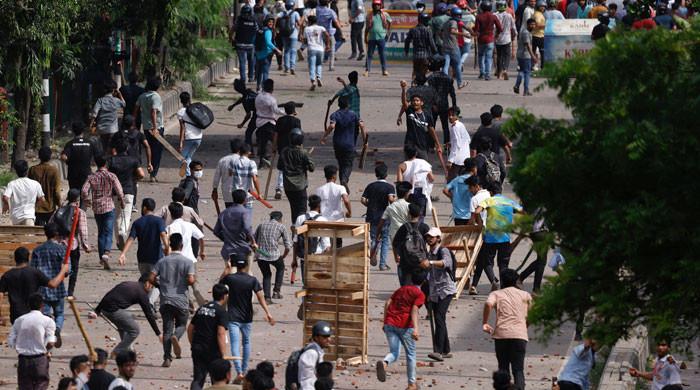Six people died including three students during protests.
Pakistani students advised to stay inside their hostels.
Ishaq Dar advises envoy to stay in touch with authorities.
Pakistani students who are currently in Bangladesh’s capital Dhaka are advised to take all possible precautions for their safety and keep distant from the ongoing violent protests against the country’s job quota system.
Six people died while scores were injured after protests by students against a quota system for government jobs turned deadly this week with the government announcing to shut down all public and private universities indefinitely from today.
The South Asian nation has been rocked by protests for weeks over public sector job quotas, which include a 30% reservation for family members of freedom fighters from the 1971 War of Independence from Pakistan.
It has sparked anger among students who face high youth unemployment rates, with nearly 32 million young Bangladeshis not in work or education out of a total population of 170 million people.
Pakistan’s High Commissioner in Bangladesh Syed Ahmad Maroof has advised the students to stay inside their hostels and stay away from the protests for their safety.
Deputy Prime Minister and Foreign Minister Muhammad Ishaq Dar spoke to Ambassador Maroof to inquire about the welfare of Pakistanis in Bangladesh.
The envoy informed Dar about the security situation and the steps taken by the high commission to ensure the welfare of Pakistanis in the country.
During their discussion, the ambassador said that the embassy has also opened a helpline for the convenience of people in distress.
The foreign minister directed Maroof to take care of the welfare of the Pakistanis living in Bangladesh, especially the students living in the Dhaka campus.
He also advised him to stay in close touch with local authorities to ensure the safety of the students.
What’s happening in Bangladesh?
Students in the country are protesting against a quota system for government jobs which include a 30% reservation for family members of freedom fighters from the 1971 War of Independence from Pakistan.
Demonstrations intensified after Prime Minister Sheikh Hasina refused to meet the protesters’ demands, citing ongoing court proceedings, and labelled those opposing the quota as “razakar”.
The protests turned violent this week when thousands of anti-quota protesters clashed with members of the student wing of the ruling Awami League party across the country. Police used rubber bullets and tear gas to disperse the protesters.
Six people, including at least three students, were killed during the clashes on Tuesday, police said.
Authorities have deployed riot police, along with the Border Guard Bangladesh paramilitary force, at university campuses across the country to maintain law and order.
Late on Tuesday, the University Grants Commission ordered all universities to shut down and instructed students to vacate the premises immediately for security reasons. High schools, colleges and other educational institutions were also shut.
Police raided the headquarters of the main opposition, the Bangladesh Nationalist Party (BNP), in Dhaka around midnight on Tuesday and arrested seven activists, including a former leader of its student wing.
The protests are the first significant challenge to Hasina’s government since she secured a fourth consecutive term in January in an election boycotted by the BNP.
Experts attribute the unrest to stagnant job growth in the private sector, making government jobs, which offer regular wage hikes and other privileges, increasingly desirable.
Currently, 56% of government jobs in Bangladesh are reserved under various quotas, including 10% for women, 10% for people from underdeveloped districts, 5% for indigenous communities, and 1% for people with disabilities.

